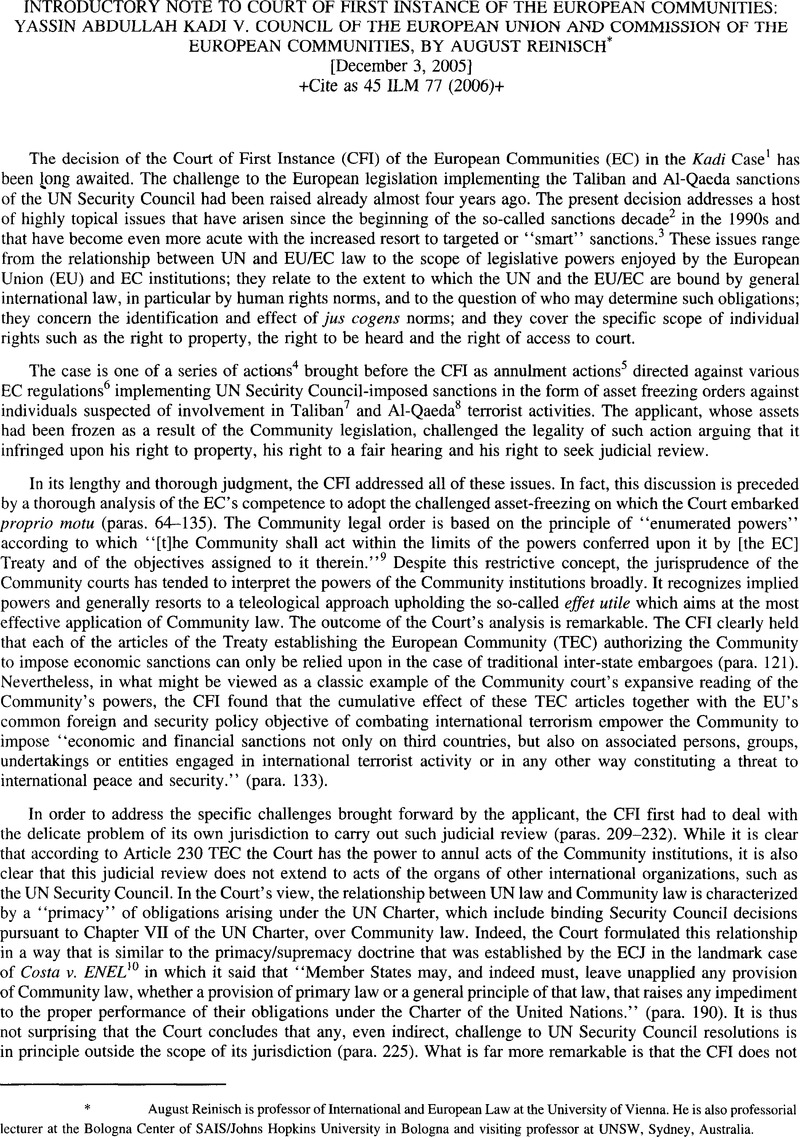No CrossRef data available.
Published online by Cambridge University Press: 27 February 2017

1 Case T-315/01,Yassin Abdullah Kadi vCouncil and Commission, Court of First Instance, 21 September 2005, not yet reported, available at<http://europa.eu.int/eur-lex/lex/LexUri Serv/LexUriServ.do?uri=CELEX:62001A0315:EN:HTML>On 17 November 2005 an appeal to the European Court of Justice has been lodged.
2 David Cortright&George A. Lopez, The Sanctions Decade: Assessing UN Strategies in the 1990s (2000).
3 David Cortright&George A. Lopez (eds.), Smart Sanctions: Targeting Economic Statecraft (2002).
4 Among them is a case originally filed in 2001 under the nameAbdirisak Aden and Others v. the Council of the European Union and the Commission of the European Communities, Case T-306/01, OJ C 44/27, 16.2.02. On 7 May 2002 the Court of First Instance rejected a request for provisional measures, Case T-306/01 R, [2002] ECR11-2387. In August 2002 Mr. Aden was removed from the sanctions list by the UN Security Council Sanctions Committee. The decision in Case T-306/01, now under the name ofAhmed AH Yusuf and Al Barakaat International Foundation v.the Council of the European Union and the Commission of the European Communities, was rendered at the same date as the judgement in theKadi Case. Available at <http://europa.eu.int/eur-lex/lex/Lex-UriServ/LexUriServ.do?uri=CELEX:62001A0306:EN: HTML> Already in September 2003 Case T-306/01 and Case T-315/01 had been joined for the purpose of the oral procedure.
5 According to Article 230(1) Treaty establishing the European Community (TEC) “[t]he Court of Justice shall review the legality of acts adopted [by the Community institutions].” If it is found that a Community act is subject to any of the annulment grounds listed in Article 230(2) TEC, such as “lack of competence, infringement of an essential procedural requirement, infringement of this Treaty or of any rule of law relating to its application, or misuse of powers” the “Court of Justice shall declare the act concerned to be void.” Article 231(1) TEC.
6 Originally, the action was directed against Council Regulation (EC) No 467/2001 of 6 March 2001 prohibiting the export of certain goods and services to Afghanistan, strengthening the flight ban and extending the freeze of funds and other financial resources in respect of the Taliban of Afghanistan, and repealing Regulation (EC) No 337/2000, OJ L 67/1. Subsequently, it was directed against Council Regulation (EC) No 881/2002 of 27 May 2002 imposing certain specific restrictive measures directed against certain persons and entities associated with Usama bin Laden, the Al-Qaida network and the Taliban, and repealing Council Regulation (EC) No 467/2001 prohibiting the export of certain goods and services to Afghanistan, strengthening the flight ban and extending the freeze of funds and other financial resources in respect of the Taliban of Afghanistan, OJ L 139/9, now amended by Council Regulation (EC) No 561/2003 of 27 March 2003 amending, as regards exceptions to the freezing of funds and economic resources, Regulation (EC) No 881/2002 imposing certain specific re-strictive measures directed against certain persons and entities associated with Usama bin Laden, the Al-Qaida network and the Taliban, OJ L 82/1.
7 UN SC Resolution 1267 (1999).
8 UN SC Resolution 1333 (2000).
9 Article 5(1) TEC.
10 Costa v. ENEL, Case 6/64 [1964] ECR 585.
11 InProsecutor v. Dusko Tadiç, Decision on the Defence Motion for Interlocutory Appeal on Jurisdiction, ICTY Appeals Chamber, 2 October 1995, Case No. IT-94-1-AR72, 35 ILM 32, at 42 (1996) the court stated that: “[…] neither the text nor the spirit of the Charter conceives of the Security Council as unbound by law.“
12 Cf. Restatement of the Law (Third) The Foreign Relations Law of the United States, §702 Commentn and Reporters’ Note 11 (1987): “Not all human rights norms are peremptory norms(jus cogens), but those in clauses (a) to (f) [i.e. genocide, slavery or slave trade, the murder or causing the disappearance of individuals, torture or other cruel, inhuman, or degrading treatment or punishment, prolonged arbitrary detention, systematic racial discrimination] of this section are […].” See also Theodor Meron, On a Hierarchy of International Human Rights, 80 AJIL 1 (1986).
13 The Legality of the Threat or Use of Nuclear Weapons, Advisory Opinion of 8 July 1996, ICJ Reports 1996, 226, para. 79.
14 Ibid.
15 See also Article 6(2) TEU which provides: “The Union shall respect fundamental rights, as guaranteed by the [ECHR] and as they result from the constitutional traditions common to the Member States, as general principles of Community law.“
16 See August Reinisch, Some Problematic Aspects of Recent EU Financial Anti-Terrorism Measures, 7 Austrian Review of European and International Law 111 (2002).
17 Dorsch Consult IngenieurgesellschaftmbH v. Council of the European Union and Commission of the European Communities, Case T-184/95, Court of First Instance of the European Communities, 28 April 1998, [1998] ECR 11-776;affirmed on appeal C-237/98 P, ECJ, 15 June 2000, [2000] ECR I- 4549.
18 Security Council Committee Established Pursuant To Resolution 1267 (1999), Guidelines of the Committee for the Conduct of its Work, adopted on 7 November 2002 and amended on 10 April 2003, available at <http://www.un.org/Docs/sc/committees/1267/1267guidelines.pdf.>
19 McElhinney v.Ireland and UK [GC], no. 31253/96, 21 November 2001, ECHR 2001-XI; see alsoAl-Adsani v. UK [GC], no. 35753/97, 21 November 2001, ECHR 2001-XI.
20 Waite and Kennedy v. Germany [GC], no. 26083/94,18February 1999, ECHR 1999-1.
21 See ILA Committee on “Accountability of International Organisations”, Final Report Berlin Conference (2004); Jose Alvarez, Judging the Security Council, 90 AJIL 1 (1996); August Reinisch, Developing a Human Rights and Humanitarian Law Accountability of the UN Security Council for the Imposition of Economic Sanctions, 95 AJIL 851 (2001); Vera Gowlland-Debbas, The Relationship Between the International Court of Justice and the Security Council in the Light of the Lockerbie Case, 88 AJIL 643 (1994).
22 Denise Matthews v. United Kingdom [GC], no. 24833/94, 18 February 1999, ECHR 1999-1.
23 Bosphorus Hava Yollari Turizm Ve Ticaret Anonim Şirketi v. Ireland [GC], ho. 45036/98, 30 June 2005. See in this volume 45 ILM 136.
1 This document was reproduced and reformatted from the text appearing at the EU website <http://europa.eu.int/eurlex/lex/LexUriServ/LexUriServ.do?uri=CELEX:62001A0315:EN:HTML> (visited December 5, 2005)